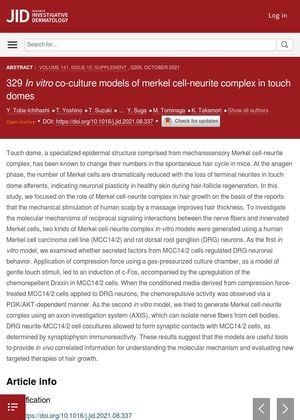In Vitro Co-Culture Models of Merkel Cell-Neurite Complex in Touch Domes
October 2021
in “
Journal of Investigative Dermatology
”

TLDR The study concluded that the developed models are effective for studying hair growth mechanisms and testing new treatments.
This study investigated the role of the Merkel cell-neurite complex in hair growth, based on reports that mechanical stimulation of the human scalp improves hair thickness. Two in vitro models were created using a human Merkel cell carcinoma cell line (MCC14/2) and rat dorsal root ganglion (DRG) neurons. The first model examined if secreted factors from MCC14/2 cells regulated DRG neuronal behavior. It was found that applying a compression force, simulating gentle touch stimuli, led to an induction of c-Fos and upregulation of the chemorepellent Draxin in MCC14/2 cells. When the conditioned media from these cells was applied to DRG neurons, chemorepulsive activity was observed via a PI3K/AKT-dependent manner. The second model used an axon investigation system (AXIS) to generate Merkel cell-neurite complex. DRG neurite-MCC14/2 cell cocultures formed synaptic contacts with MCC14/2 cells, as determined by synaptophysin immunoreactivity. The study concluded that these models are useful tools for understanding the molecular mechanism and evaluating new targeted therapies of hair growth.
